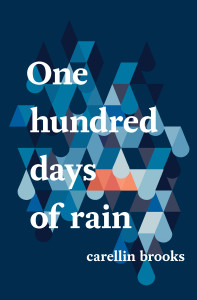World Health Day: Let’s Talk (and Read)

Every year, April 7th is known as World Health Day. It is a day of spreading global health awareness, started by the World Health Organization (WHO). It is important to spread the word and get involved in this campaign to keep everyone well-informed and to get help to those who need it. Every year the WHO has a central theme that they focus on, and this year it is Depression: Let’s Talk. To honour World Health Day, and to help raise awareness about it, we’re recommending five BookThug books that explore themes of illness, depression, and grief. Without further ado, let’s get to it.
One Hundred Days of Rain
by Carellin Brooks

“The water a cascade, a cavalcade, a call to arms, a march. It depresses one, the very regularity of it. The inevitability. You will get wet again. Yes you will no matter if you buy cute rubbers and a bright mackintosh. No matter where you store your umbrella. Despite the magazines that exhort you to this new colour or kicky print. Dots.”
Beautiful Children with Pet Foxes
by Jennifer LoveGrove

“The beautiful children with pet foxes
are not sleeping well.
Too many shadows bob on the ceiling,
each one urgent and obscene
hissing loose a litany of secrets,
the foxes always keening,
the air too crowded for sleep
to find its way back in.”
Silvija
by Sandra Ridley

“Do you understand?
Do I understand?
Are you laughing now?
Weeping.
Do you understand?
I understand.
This is difficult for you to say.
This is difficult for you to say.”
Waiting Room
by Jennifer Zilm

“Percentage of people who won’t ever like me: 30%
Percentage of people who will suffer from depression in their lifetime: 25%
Percentage of patients for whom antidepressants will be efficacious: 20%
Percentage of patients for whom antidepressants will act only as placebo: 80%f”
Testament
by Vickie Gendreau, translated by Aimee Wall

“Every day since the twenty-second treatment, I think I’m going to die on the X-ray table, that my heart is going to leave my chest, that it’ll explode. Panic attacks. I always have to keep my back arched, exaggeratedly arched. My book catches up with me; my illness catches up with me. It usually happens after I’ve eaten. Palpitations, eyes ringed with black, feeling like a heap of organs with a fuse. It’s finished, it’s all over. I have to swallow more pills more often to avoid feeling like I’m dying. It’s not made up, all this. Nothing here is made up. I’m telling you everything.”

